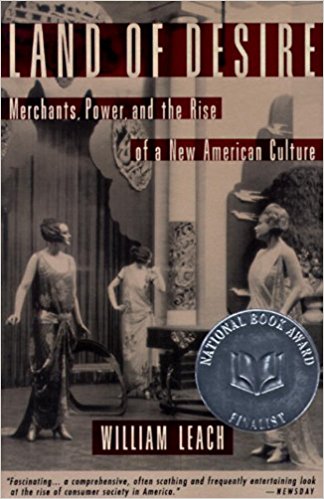Feeling Weird About Christmas Shopping: Read This
R.H. Lossin
Christmas seems like a good time to think about what it means to live in a consumer culture—to consider how we have become beings who experience a large part of our social and personal lives as an exchange of cash and goods. Why we say bizarre shit like “I’m worth it.” Why we apologize and show love with gifts. Why we make vision boards to invite ‘abundance’ into our lives. Why gift giving is both so emotionally fraught and crassly economic. Why we equate bad gifts with emotional insincerity and feel wounded when we receive the wrong object.
According to William Leach, there is an answer to these questions. During the late 19th century, American capitalism experienced a “crisis in distribution.” As a result of continuous production processes, American businesses were rather suddenly producing much more stuff and it needed buyers. Before 1880, writes Leach, “most markets were local and regional” and “the culture was agrarian, republican, and religious.” Values were not largely determined by “what they could bring in the market.” But this early republican culture was largely displaced by the turn of the century, at which point we were well on our way to becoming our shopping selves.
The new consumer culture did not democratize money and goods. What it did democratize was “desire”—the right of all Americans to want and to choose.
“Department stores were places to buy things, but they were equally shrines to capitalism”
Perversely, the choices opened up by a new culture of consumption thoroughly restricted the definition of a good life to a singular vision. From this point on “pecuniary values would constitute for many people the base measure for all other values.” The centerpiece of this process—the site of consumer desire--was the department store. There were department stores in other countries, but they were limited to capital cities. In the United States they were constructed everywhere.
Department stores were places to buy things, but they were equally shrines to capitalism: they “revealed the totality of what the American economy was producing and importing.” And in doing this they didn’t so much satisfy desires as create them—producing needs that no one realized they even had.
The crisis in distribution led businessmen to aggressively intervene in output, labor discipline and price controls. But it also led them to invest enormous amounts of time and capital in the effort to “change minds by producing a new consumer consciousness, by transforming imagination.” They brought to bear innovations in lighting and colored glass; they created a service industry to flatter and pamper their customers; they hosted cultural events. And minds did change. Coincidence is not causation, but the late 19th and early 20th saw the increase of religious movements organized around ‘mind cure’—the conviction that you could, through an act of will “cure [your] own diseases and create heaven on earth.” You just need to desire it enough.
“[Sheet glass] democratized a certain limited access, stoked desire and denied its fulfillment.”
The disciplining desire of ‘mind cure’ found its analog in display windows. Sheet glass was particularly important to the department store’s dialectic of availability and denial, “permitting everything to be seen yet rendering it all beyond touch.” It democratized a certain limited access, stoked desire and denied its fulfillment. “Unless you shatter the window and go in and pay for it, you cannot have it. In such a context, the breaking of glass could have easily become a class act.”
But few windows were broken. Business owners such as Marshall Fields were instrumental to the suppression of labor “trouble” in cities like Chicago. That is, the suppression of organized efforts to gain power—not just goods—and the collectivity that this type of action requires. That constant consumption brings with it a mandate of self-improvement is not a coincidence. The ability to sell unnecessary things requires a psychology that is shaped and satisfied by individualized acts of buying rather than solidarity or civic engagement.
So Merry Christmas, it’s not your fault. But do yourself a favor and set your vision board on fire.
R.H. Lossin is a PhD Candidate in the Department of Communications at Columbia University where she teaches Contemporary Civilization. She is writing a dissertation on sabotage and American labor.
Featured Books
RECENT INTERVIEWS





